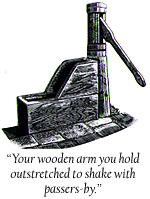Main Menu · Search ·Current Issue ·Contact ·Archives ·Centennial ·Letters to the Editor ·FAQs


From our good friend William H. Bond, Ph.D. '41, comes a remembrance of the one and only John Shea, longtime "guardian and familiar spirit" of Widener Library. Professor Bond, who joined the library staff in 1946, is Librarian of the Houghton Library emeritus, and, as he explains, is also the curator of a valuable collection of his own. He writes, in part:
Universities spawn legendary figures, and thrive on them, too. Some are formidable, some benign. Among the latter, John Shea deserves particular recognition.
John was, needless to say, Irish to the core. He was born in Cambridge in 1881 and graduated from Rindge Technical High. In 1905 he was hired to work in the coat room of the Harvard Library, then located in Gore Hall, a Gothic building now long gone. Within a month he was assigned a new job in the stack department. There he remained for 49 years, doing everything in his power to see that the wheels turned smoothly behind the scenes in the College Library.
In 1946 John was given a Corporation appointment as superintendent of the stack and of the Harry Elkins Widener Memorial Building. No one in such a position had ever received a Corporation appointment. His long career was climaxed by the award of an honorary Master of Arts degree in 1953, the year before he retired. "He has for many years helped scholars on their way to knowledge," read the degree citation.
Untrained in scholarship, he absorbed its spirit through his pores. A big man in every sense of the word, John discharged his duties with good humor and civility. He hired and directed the students and townies who paged books and reshelved them; he delivered the mail all through the library; he knew many of the students and all the librarians and professors; he arrived early and stayed late.
John was the soul of kindness. If someone left vital notes on a carrel at closing time, he would unlock doors and help retrieve them. When somebody needed to check a reference in a scholarly periodical missing from the shelf, he would track it down, extract it temporarily from a study, and replace it before the study-holder realized it was gone--or diplomatically borrow it if the study was occupied.
He also had an uncanny knack for finding misplaced books in the vast and cavernous stacks. To locate a lost volume, he assured a library patron, "I will leave no stone unthrown."
John's genius for such malapropisms was one of his most endearing traits. His malapropisms, in fact, were generally the mot juste, and came to be valued as such by devoted amanuenses who noted, exchanged, and compared them. Mainly by a process of attrition through retirement, sundry lists and scraps of notes have been finding their way into my hands, and they now constitute a substantial collection. Here are some samples.
John reported to the Librarian that there was "a terrible academic of stealing going on in the stacks."
Of an elderly man: "He isn't very dapple."
He reported that someone was looking for lodgings "within a short radiance of Harvard Square." In contrast, "Professor Young doesn't want to live in the vicissitude of Harvard Square."
"Keep out of the Square the day of a football game, the traffic is terribly digested."
On hot-weather clothing: "It's all right as long as you're not indecently unexposed."
Praise for a colleague: "She has always been a faithful and conscious employee."
To a lazy stack attendant: "You are getting very laxative in your work."
A visiting professor from France gave John a bottle of wine "as a momentum."
A certain piece of equipment "has outlived its uselessness."
Some ephemeral material was "fit only for the insinuator."
"We'll have to suspense with that."
Interviewing a job applicant: "Do you write an eligible hand?"
"I'm the purification of innocence."
The head janitor, Mr. Maloney, "has a maniac for sweeping the basement."
To W.A. Jackson's secretary, who was complaining about a heavy morning mail: "I'll come back when you're in a more receptacle mood."
On another occasion John promised her "a new supply of vanilla envelopes."
The Union Catalog Room had been equipped with "venereal blinds" and "osculating fans." When an inclined walkway was installed to replace some stairs: "Oh, they're putting in a vamp for the boys."
*
"John died, peacefully and at home, in 1959," adds Bond. "Let no one suppose that this collation of his sayings is intended to poke fun at such a humane man. Nobody collected his words to mock him. Those who knew John Shea treasured him as they did the magical words he uttered."
~Primus IV